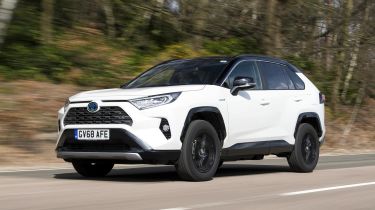Toyota RAV4 Hybrid running costs, insurance, warranty & tax
The Toyota RAV4 represents a good deal for company-car users, but private buyers are likely to find a diesel SUV cheaper to buy and run
| Ins group | Warranty | Service intervals | Annual company-car tax cost (20%/40%) |
|---|---|---|---|
| 25-30 | 5yrs / 100,000 miles | 1 yr/10,000 miles | From £2,086 / £4,172 |
In terms of routine servicing, insurance cover and fuel economy, running costs for the latest Toyota RAV4 are on par with many of its class rivals.
There are two points to note, though: its hybrid-only status makes the Toyota more expensive to buy in the first place than many of its petrol or diesel rivals, but this technology also means it has impressively low CO2 emissions, so company-car tax is relatively low for an SUV of this size.
Private buyers may find a diesel SUV with a lower purchase price and better fuel economy makes more financial sense in the long run than the RAV4, depending on how much mileage they cover and whether it's in town or on the motorway.
Toyota RAV4 Hybrid insurance group
The Toyota RAV4 Hybrid falls into insurance groups 25 to 30 depending on what trim you go for, so it can be fairly competitive on insurance costs.
Warranty
All Toyota passenger vehicles sold in the UK are covered by a three-year/100,000-mile warranty, but Toyota's 'Relax' warranty – introduced in June 2021 – extends this for up to a maximum of 10 years if the car is serviced at a Toyota main dealer every 12 months. Hyundai's warranty runs for five years, but has no mileage limit, while Kia's is limited to 100,000 miles, but runs for up to seven years as long as that mileage isn't exceeded.
It's better than you get with many European-built rivals, however: the likes of Renault, Skoda, SEAT, Volkswagen, Peugeot and Citroen only offer three years' coverage, in many cases with 60,000-mile limit on the policy.
Road tax
The RAV4 is subject to the standard UK annual road-tax (VED) rate for hybrid vehicles of £145 a year – representing a £10 annual saving on a petrol or diesel-engined car. Its CO2 emissions aren't low enough to exempt it from the London Congestion Charge, however, with only zero-emissions vehicles now qualifying.
